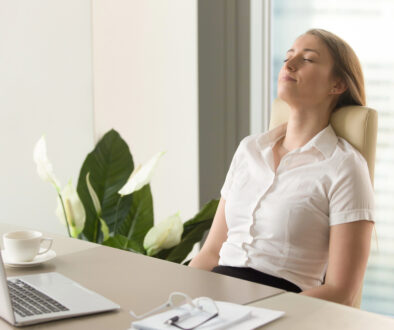Blissful Beauty Sleep Can Help Your Career

I am delighted to feature this guest blog post from Jen Owen, an Adult Nurse Practitioner specializing in Integrative Medicine. She has over 20 years of experience working with natural remedies for health, including herbs, supplements, and nutrition. She combines this knowledge with conventional medicine to find the very best plan for each patient. Jen also enjoys educating the public through her regular blog and newsletter and online education. Her E-course, Health Transformations, offers self-paced guidance for transforming the body, mind, and soul.
Insomnia is a very common issue, which can mean different things to different people. Some people have trouble falling asleep, some have trouble staying asleep, and some have both. Insomnia can be caused by many factors and anyone who has followed me or seen me as a patient will know that I strongly believe in finding the root of the problem. It can be caused by hormonal changes, adrenal imbalances, thyroid issues, food sensitivities, alcohol overindulgence, certain medications and more. If these simple tips do not help you sleep, then you really need to see a practitioner who can help you get to the bottom of your sleep struggles.
First, let’s look at some practical tips for insomnia. Avoid caffeine later in the day. Establish a regular routine of going to bed at night and rising in the morning. Many people sleep better if they are asleep before 10pm. Use a white noise machine or fan to block out noise. Make your room as dark as possible; even a small amount of light, like from an alarm clock can confuse your system to thinking it is daytime. Don’t eat large meals late in the day and limit fluids after 8pm if you are getting up to urinate during the night and cannot get back to sleep. Add meditation to your life to help with stress.
If you have tried all of those things and nothing helped, you can try some over-the-counter herbs and supplements for insomnia. My two favorite supplements to help you sleep are melatonin and magnesium. Melatonin helps to reset your circadian rhythm, which affects your sleep/wake cycles. Melatonin resets your internal clock to tell your body when to sleep and when to wake. A dose of 2-3mg for a few weeks will often do the trick. For long-term use, I recommend a dose of 1mg or less.
Magnesium deficiency can cause excitability in the muscles and the brain. Magnesium plays important roles in the contraction and relaxation of muscles and less understood roles in the nervous system. I have found magnesium to be very beneficial for some people with insomnia, especially those who can’t sleep due to aches and pains or restless legs. It also seems to have a calming effect on the brain, allowing for more restful sleep. The dose of magnesium depends on the type you are taking. I prefer magnesium glycinate 120mg 1-2 at bedtime. Watch out for magnesium citrate, which has a powerful action on the bowels.
As usual, herbs are my favorite remedies for insomnia. Herbs for sleep are gentle and work very effectively. Valerian is an old-favorite for insomnia and it is a non-addictive. The root is the part used for medicine and can be taken as extract, capsules, or tea if you are brave. Valerian smells a bit like dirty old socks. Some people, including myself, are stimulated by Valerian, but this does not seem to be true for most people.
Skullcap is one of my personal favorites for insomnia, as well as mild anxiety. It does not have a sedating effect, but works to strengthen the entire central nervous system. When the nervous system is strong, there is much less nervous stress, thus inducing more restorative and peaceful sleep.
Chamomile is another great herb for insomnia and most people really enjoy the taste as an infusion. Chamomile helps to calm the nerves and relieve tension. It also has anti-inflammatory effects, so can relieve mild aches and pains and digestive disturbances.
Good quality sleep is so important. We cannot be the best we can be if we are not restoring all of our systems each evening. We should all be getting 7-8 hours of sleep each night and a little more when we can. If you are not sleeping well, give these suggestions a try. If these simple measures do not get you sleeping blissfully, it is time to visit with a natural healthcare provider near you or your family physician.






